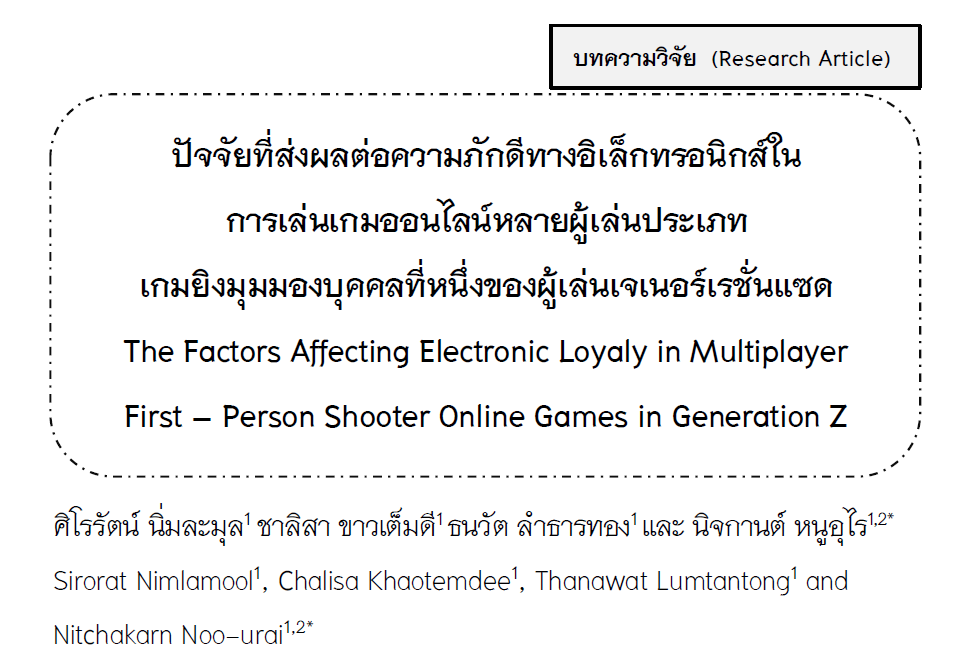The Factors Affecting Electronic Loyaly in Multiplayer First – Person Shooter Online Games in Generation Z
Keywords:
Lifestyles, Attitudes, Electronic loyalty, Online gamesAbstract
This research article aims to: 1) analyze the influence of generation z's lifestyle on electronic loyalty in playing multiplayer first-person shooter online games, and 2) analyze the influence of generation z's attitudes on electronic loyalty in playing multiplayer first-person shooter online games. The research design employs a quantitative approach. The sample comprises 385 individuals from Generation z who play multiplayer first-person shooter online games and reside in Thailand. Data collection was conducted through online questionnaires distributed to generation z who play multiplayer first-person shooter online games, utilizing purposive sampling. The research instrument was an online questionnaire. Data analysis was performed using descriptive statistics, including frequency, percentage, mean, standard deviation, and Inferential statistics using multiple regression analysis.
The research findings indicate that Generation z's lifestyle including activities, interests, and opinions significantly influence e-loyalty in multiplayer first-person shooter online games at the 0.05 statistical significance level. Additionally, Generation z's attitudes including cognitive, affective, and behavioral components significantly impact e-loyalty in multiplayer first-person shooter online games at the 0.05 statistical significance level.
References
ชูชัย สมิทธิไกร. (2562). พฤติกรรมผู้บริโภค (พิมพ์ครั้งที่ 7). กรุงเทพฯ: สำนักพิมพ์จุฬาลงกรณ์มหาวิทยาลัย.
ธนกฤต ดีพลภักดิ์. (2556). การเปิดรับสื่อ พฤติกรรม และผลกระทบจากการเล่มเกมออนไลน์ MMORPG (Massively Multiplayer Online Role-Playing Game) ของนักเรียนมัธยมศึกษาตอนปลายในเขตกรุงเทพมหานคร. วารสารปัญญาภิวัฒน์, 5(ฉบับพิเศษ), 63-75.
บุญใจ ศรีสถิตย์นรากูร (2555). การพัฒนาและตรวจสอบคุณภาพเครื่องมือวิจัย: คุณสมบัติการวัดเชิงจิตวิทยา. กรุงเทพฯ: โรงพิมพ์แห่งจุฬาลงกรณ์มหาวิทยาลัย.
ปภาภรณ์ ไชยหาญชาญชัย และ สราวุธ อนันตชาติ (2564). ความเหมือนที่แตกต่าง: รูปแบบการดำเนินชีวิตของผู้บริโภคเจเนอเรชันวาย. วารสารนิเทศศาสตร์, 39(2), 19-43.
ยุทธ ไกยวรรณ์ (2563). การวิเคราะห์สถิติตหลายตัวแปรด้วย SPSS. กรุงเทพฯ: โรงพิมพ์แห่งจุฬาลงกรณ์มหาวิทยาลัย.
เสาวลักษณ์ เขตสูงเนิน. (2566). ไทยกำลังจะก้าวสู่ประเทศศูนย์กลาง E-Sports ระดับโลก เมื่อมูลค่าตลาดโตก้าวกระโดด 3.8 หมื่นล้านบาท คาดอีก 4 ปี เกมเมอร์ไทยพุ่งเป็น 18 ล้านคน. สืบค้น 15 พฤศจิกายน 2567, จาก https://thestandard.co/thailand-world-e-sports.
อิศราวรรณ คงปรีชา. (ม.ป.ป.). โอกาสและความท้ายทายของวงการอีสปอร์ตไทย. สืบค้น 20 มีนาคม 2567, จาก https://www.depa.or.th/en/article-view/challenges-of-the-Thai-esports-industry.
อิสริยาภรณ์ อัศเวศน์ และ ระบิล พ้นภัย. (2565). ทัศนคติและคุณภาพการบริการที่ส่งผลต่อความภักดีในตราสินค้าวิดีโอสตรีมมิ่งของผู้บริโภคในเขตกรุงเทพมหานคร. วารสารวิทยานิพนธ์การจัดการปริทัศน์, 24(1), 1-10.
เดลินิวส์ ออนไลน์. (2567). “การีนา” เผยทิศทางดำเนินธุรกิจปี 2567 ตอกย้ำเบอร์ 1 อุตสาหกรรมเกม-อีสปอร์ตไทย พร้อมส่งคอนเทนต์เกมหนุนซอฟต์พาวเวอร์. สืบค้น 15 พฤศจิกายน 2567, จาก https://www.dailynews.co.th/news/3311684/.
Anderson, R., E., and Srinivasan, S., S. (2003). E-satisfaction and e-loyalty: a contingency framework. Psychology & Marketing, 22(2), 123-138.
Exactitude Consultancy. (2566). ภาพรวมตลาดเกม. สืบค้น 20 มีนาคม 2567, จาก https://exactitudeconsultancy.com/th/reports/38267/gaming-market/#report-details.
Hassan, H., S., Thurasamy, T., R., & Loi, W., Y. (2017). E-lifestyle, customer satisfaction and loyalty among mobile subscribers in Thailand. International review of management and marketing, 7(1), 354-362.
Kline, R., B. (2016). Principles an practice of structural equation modeling (4th ed.). New York: The Guilford press.
Kotler, Kartajaya, Setiawan, (2021). Marketing 5.0: Technology for Humanity. New York: John Wiley & Sons.
Mafea, M., G., A., Kristyanto, V., S., & Lukit, R., S., H. (2023). Does experiential marketing and lifestyle impact on customer loyalty? study at excelso coffee shop kupang nusa tenggara timur Indonesia). in Proceedings of the 4th Asia Pacific Management Research Conference (664-67). DOI:10.2991/978-94-6463-076-3_51.
Schiffman, L., G, & Wisenblit, J. (2019). Consumer behavior (12th ed.). UK: Pearson education.

Downloads
Published
How to Cite
Issue
Section
License
Copyright (c) 2024 Phayao University

This work is licensed under a Creative Commons Attribution-NonCommercial-NoDerivatives 4.0 International License.
ผู้นิพนธ์ต้องรับผิดชอบข้อความในบทนิพนธ์ของตน มหาวิทยาลัยพะเยาไม่จำเป็นต้องเห็นด้วยกับบทความที่ตีพิมพ์เสมอไป ผู้สนใจสามารถคัดลอก และนำไปใช้ได้ แต่จะต้องขออนุมัติเจ้าของ และได้รับการอนุมัติเป็นลายลักษณ์อักษรก่อน พร้อมกับมีการอ้างอิงและกล่าวคำขอบคุณให้ถูกต้องด้วย
The authors are themselves responsible for their contents. Signed articles may not always reflect the opinion of University of Phayao. The articles can be reproduced and reprinted, provided that permission is given by the authors and acknowledgement must be given.







